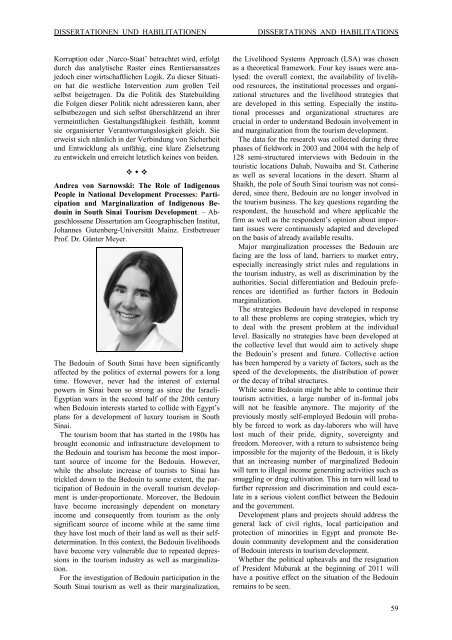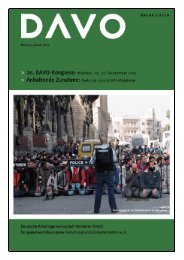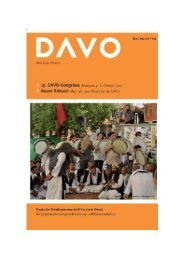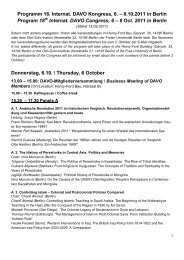4 Dissertationen und Habilita- tionen / Dissertations and Ha- bilitations
4 Dissertationen und Habilita- tionen / Dissertations and Ha- bilitations
4 Dissertationen und Habilita- tionen / Dissertations and Ha- bilitations
Sie wollen auch ein ePaper? Erhöhen Sie die Reichweite Ihrer Titel.
YUMPU macht aus Druck-PDFs automatisch weboptimierte ePaper, die Google liebt.
DISSERTATIONEN UND HABILITATIONEN DISSERTATIONS AND HABILITATIONS<br />
Korruption oder ‚Narco-Staat’ betrachtet wird, erfolgt<br />
durch das analytische Raster eines Rentiersansatzes<br />
jedoch einer wirtschaftlichen Logik. Zu dieser Situation<br />
hat die westliche Intervention zum großen Teil<br />
selbst beigetragen. Da die Politik des Statebuilding<br />
die Folgen dieser Politik nicht adressieren kann, aber<br />
selbstbezogen <strong>und</strong> sich selbst überschätzend an ihrer<br />
vermeintlichen Gestaltungsfähigkeit festhält, kommt<br />
sie organisierter Verantwortungslosigkeit gleich. Sie<br />
erweist sich nämlich in der Verbindung von Sicherheit<br />
<strong>und</strong> Entwicklung als unfähig, eine klare Zielsetzung<br />
zu entwickeln <strong>und</strong> erreicht letztlich keines von beiden.<br />
� � �<br />
Andrea von Sarnowski: The Role of Indigenous<br />
People in National Development Processes: Participation<br />
<strong>and</strong> Marginalization of Indigenous Bedouin<br />
in South Sinai Tourism Development. – Abgeschlossene<br />
Dissertation am Geographischen Institut,<br />
Johannes Gutenberg-Universität Mainz. Erstbetreuer<br />
Prof. Dr. Günter Meyer.<br />
The Bedouin of South Sinai have been significantly<br />
affected by the politics of external powers for a long<br />
time. However, never had the interest of external<br />
powers in Sinai been so strong as since the Israeli-<br />
Egyptian wars in the second half of the 20th century<br />
when Bedouin interests started to collide with Egypt’s<br />
plans for a development of luxury tourism in South<br />
Sinai.<br />
The tourism boom that has started in the 1980s has<br />
brought economic <strong>and</strong> infrastructure development to<br />
the Bedouin <strong>and</strong> tourism has become the most important<br />
source of income for the Bedouin. However,<br />
while the absolute increase of tourists to Sinai has<br />
trickled down to the Bedouin to some extent, the participation<br />
of Bedouin in the overall tourism development<br />
is <strong>und</strong>er-proportionate. Moreover, the Bedouin<br />
have become increasingly dependent on monetary<br />
income <strong>and</strong> consequently from tourism as the only<br />
significant source of income while at the same time<br />
they have lost much of their l<strong>and</strong> as well as their selfdetermination.<br />
In this context, the Bedouin livelihoods<br />
have become very vulnerable due to repeated depressions<br />
in the tourism industry as well as marginalization.<br />
For the investigation of Bedouin participation in the<br />
South Sinai tourism as well as their marginalization,<br />
the Livelihood Systems Approach (LSA) was chosen<br />
as a theoretical framework. Four key issues were analysed:<br />
the overall context, the availability of livelihood<br />
resources, the institutional processes <strong>and</strong> organizational<br />
structures <strong>and</strong> the livelihood strategies that<br />
are developed in this setting. Especially the institutional<br />
processes <strong>and</strong> organizational structures are<br />
crucial in order to <strong>und</strong>erst<strong>and</strong> Bedouin involvement in<br />
<strong>and</strong> marginalization from the tourism development.<br />
The data for the research was collected during three<br />
phases of fieldwork in 2003 <strong>and</strong> 2004 with the help of<br />
128 semi-structured interviews with Bedouin in the<br />
touristic locations Dahab, Nuwaiba <strong>and</strong> St. Catherine<br />
as well as several locations in the desert. Sharm al<br />
Shaikh, the pole of South Sinai tourism was not considered,<br />
since there, Bedouin are no longer involved in<br />
the tourism business. The key questions regarding the<br />
respondent, the household <strong>and</strong> where applicable the<br />
firm as well as the respondent’s opinion about important<br />
issues were continuously adapted <strong>and</strong> developed<br />
on the basis of already available results.<br />
Major marginalization processes the Bedouin are<br />
facing are the loss of l<strong>and</strong>, barriers to market entry,<br />
especially increasingly strict rules <strong>and</strong> regulations in<br />
the tourism industry, as well as discrimination by the<br />
authorities. Social differentiation <strong>and</strong> Bedouin preferences<br />
are identified as further factors in Bedouin<br />
marginalization.<br />
The strategies Bedouin have developed in response<br />
to all these problems are coping strategies, which try<br />
to deal with the present problem at the individual<br />
level. Basically no strategies have been developed at<br />
the collective level that would aim to actively shape<br />
the Bedouin’s present <strong>and</strong> future. Collective action<br />
has been hampered by a variety of factors, such as the<br />
speed of the developments, the distribution of power<br />
or the decay of tribal structures.<br />
While some Bedouin might be able to continue their<br />
tourism activities, a large number of in-formal jobs<br />
will not be feasible anymore. The majority of the<br />
previously mostly self-employed Bedouin will probably<br />
be forced to work as day-laborers who will have<br />
lost much of their pride, dignity, sovereignty <strong>and</strong><br />
freedom. Moreover, with a return to subsistence being<br />
impossible for the majority of the Bedouin, it is likely<br />
that an increasing number of marginalized Bedouin<br />
will turn to illegal income generating activities such as<br />
smuggling or drug cultivation. This in turn will lead to<br />
further repression <strong>and</strong> discrimination <strong>and</strong> could escalate<br />
in a serious violent conflict between the Bedouin<br />
<strong>and</strong> the government.<br />
Development plans <strong>and</strong> projects should address the<br />
general lack of civil rights, local participation <strong>and</strong><br />
protection of minorities in Egypt <strong>and</strong> promote Bedouin<br />
community development <strong>and</strong> the consideration<br />
of Bedouin interests in tourism development.<br />
Whether the political upheavals <strong>and</strong> the resignation<br />
of President Mubarak at the beginning of 2011 will<br />
have a positive effect on the situation of the Bedouin<br />
remains to be seen.<br />
59





